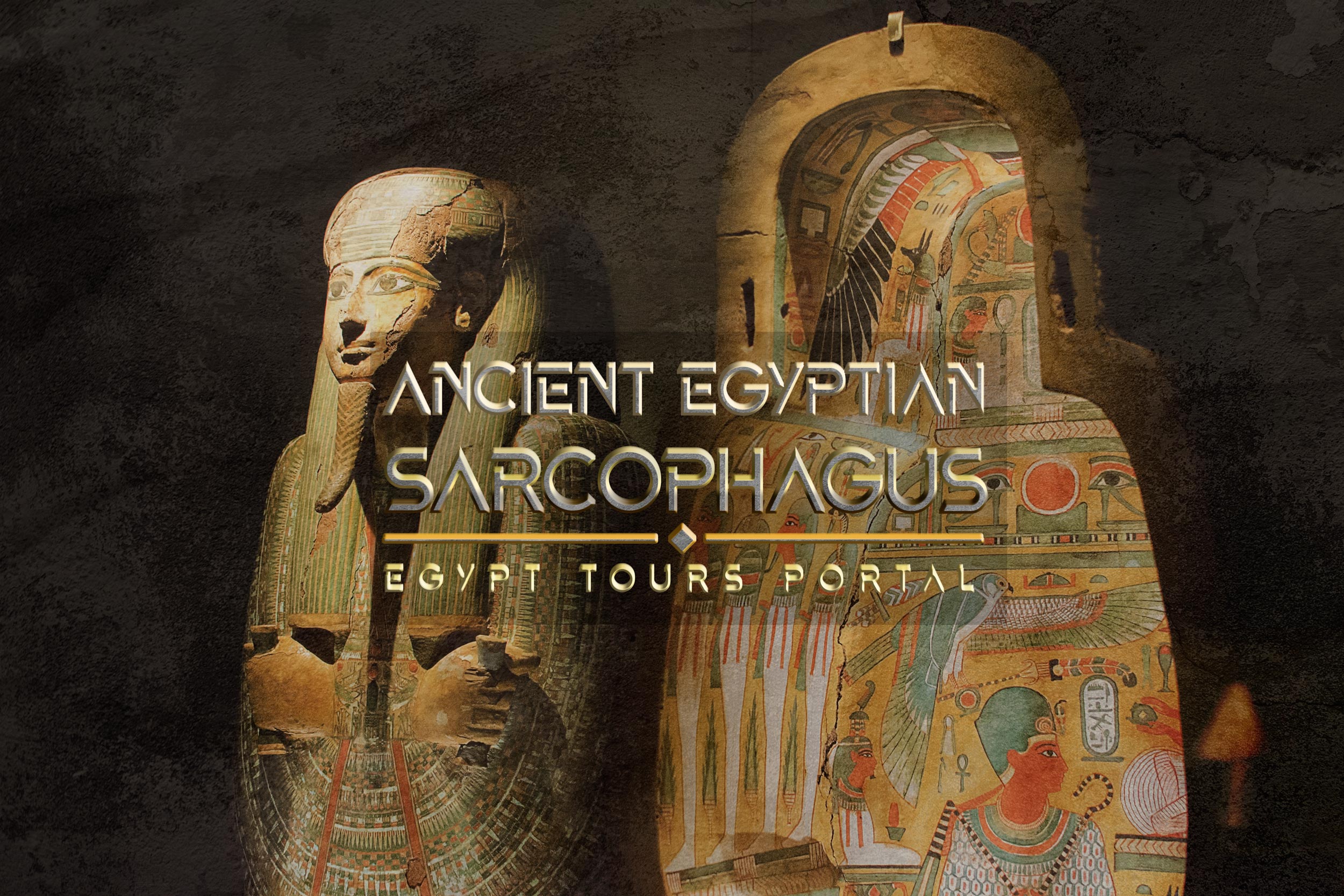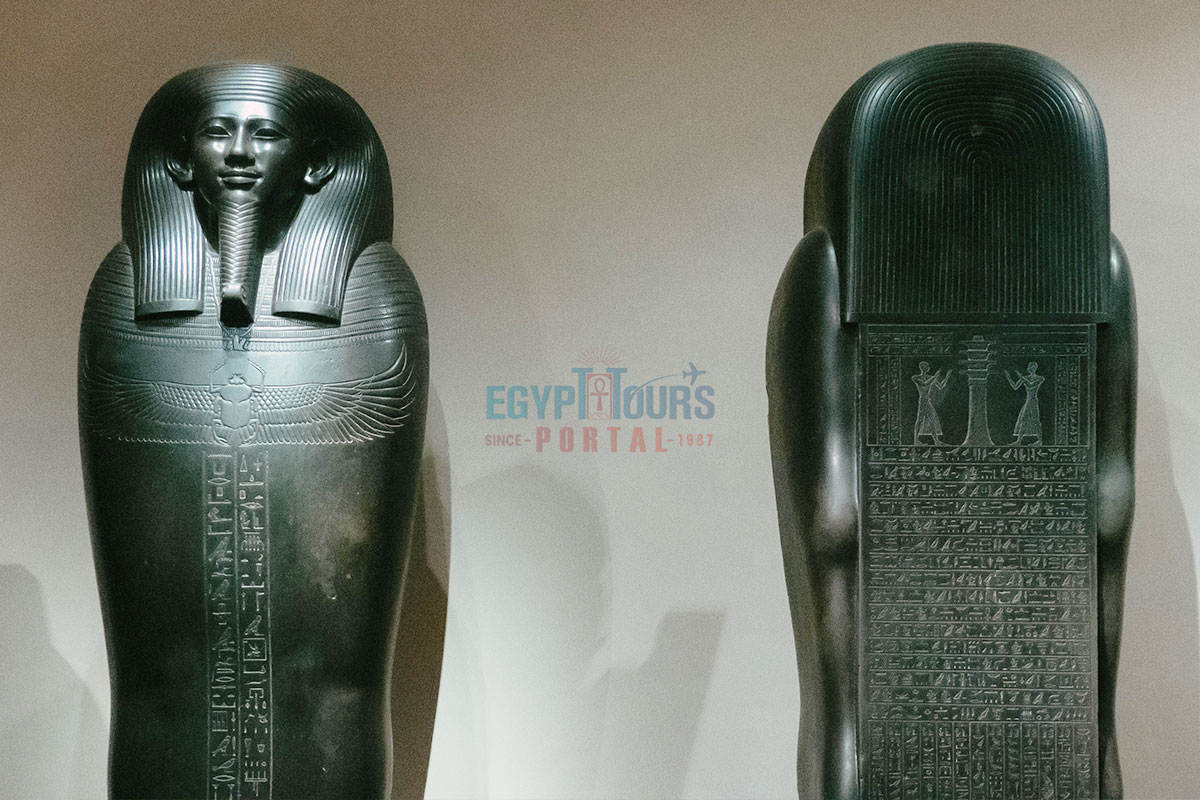
The ancient Egyptian sarcophagus is a magical vessel constructed to stop the flow of time and protected the physical and spiritual aspects of the Egyptian mummies to the heights degree. The Ancient Egyptians had a strong belief in the afterlife, awakening after death, and that death is nothing but moving to an advanced level of existence and awareness.
The ancient Egyptian coffin and sarcophagus were to preserve the bodies in the best manner after performing the mummification process. The ancient Egyptian coffins held a great created se of artistry filled with incredible writings and enchanting colorful carvings to help the dead make their way to the afterlife.

The ancient Egyptian religion was the key to creating ancient Egyptian coffins. They worked hard to transform the bodies into mummies through the mummification process as the body had to be preserved so the spirit known as "AKH" can enter the afterlife.
The body was placed within a case box that is located between the mummy and the coffin then placed in the sarcophagus then placed in the tomb. To offer the highest level of protection, all the mummies were placed in coffins which were considered to be a key element in the burial assemblage.

The oldest sarcophagi in existence were used by pharaohs of the 3rd dynasty who reigned from about 2686 to 2613 BCE. The ancient coffins were considered to be the eternal and immortal dwelling of the dead. During the old kingdom of Egypt (2686 -2181 BC) rectangular coffins were built to resemble their amazing residences. The coffin’s shape showcases where the deceased rested and that they received offerings from their families.
Funerary texts such as the coffin Texts were used by the common people written on their interior during the end of the middle kingdom of Egypt and the beginning of the middle kingdom (2040 – 1782 BC). The coffin texts were spells used to help the deceased reach and prosper in the afterlife. The nature of the afterlife was in constant change plus the dead themselves were considered to be a manifestation of Osiris the god of the dead. The shape of the sarcophagus was replaced by an anthropoid shape which has a massive pair of wings known as the decoration style of Rishi which is associated with the goddesses Isis and Nephthys who brought Osiris back from the dead to become the ruler of the Underworld.
Early examples of Ancient Egyptian Sarcophagi contained a collar, wig, and Osiride face plus the body was pained with the color white and the bands were filled with texts, crossed over the lid then leading all the way to the coffin case. The bands of the coffin represent the mummy bandages that are associated with Osiris the mummified ruler of the underworld.
Explore 50 famous Ancient Egyptian coffins with informative facts and captivating photos of each ancient Egyptian coffin in this article. Click now!
Read MoreAt the end of the 18th dynasty, the white background was replaced with black which align with elements of Osiride of rebirth and fertility. During the Ramesside era, all the features of the anthropoid remained and a yellow background was used to reflect the solar elements of ancient Egyptian religion plus the spells used were taken directly from the book of the dead. After the end of the new kingdom (1570 – 1050 BC) the decoration became simple due to the level of economic distress.
In the 25th dynasty, many famous decorative themes such as the "Embalming of Osiris" and the "Weighing of the Heart". In the Greco-Roman period (332 BC -395 AD) the coffins were added with an incredible Hellenic feature which represents a huge shift in the construction and decoration of coffins. DNA analysis was used on the Ancient Egyptian Sarcophagus which showcases great facts about the history and culture of certain time periods.

Most of the coffins were made out of wood, metal, pottery, or stone. Gold and silver were used to decorate the coffin. The ancient Egyptians believed that remembering one’s name will ensure their entry to the afterlife, that’s why the sarcophagus was included with the name of the deceased. It also included a record of their accomplishments. In the old kingdom, the coffins were not decorated, and later on, simple offering formulas were put on such as Wadjet and the false door which is painted to offer assistance from the hidden realm plus a list of food offerings.
The image of a scarab was found across all the coffins which is a sign of rebirth. A mask was considered to represent the strength of the mummy’s spirit plus guard the soul of the mummy from evil spirits during their time in the afterworld. The exterior of the sarcophagi was carved to resemble the face and body of the mummy. One of the most famous ancient Egyptian Sarcophagus is found at the golden tomb of Tutankhamun in the Valley of the Kings.
Ancient Egyptian Sarcophagus where a shell that protects the essence of ancient Egyptian travelers who seek to cross the boundaries of reality. Experience the wonder of ancient Egypt for yourself with our Egypt classic tours! Visit the land of Pharaohs and marvel at the achievements of one of the world's oldest civilizations.
Private 4 Days Cairo Tour Packages for Irish Travelers 4 days Cairo Egypt Tour packa...
Tour Location: Cairo – Giza...
5 Days Cairo and Alexandria Tour Package For Irish Travelers 5 days Cairo and Alexan...
Tour Location: Cairo/Giza/Alexandria...
6 Days Cairo, Luxor & Aswan Tour Package For Irish Travelers 6 days Cairo, Luxor...
Tour Location: Cairo/Giza/Aswan/Luxor...
Amazing 7 Days Cairo and Hurghada Holiday for Irish Travelers 7 Days Cairo & Hur...
Tour Location: Cairo – Giza – Hurgh...
Special 8 Days Cairo Nile Cruise and Hurghada Tour for Irish Travelers 8 days Cairo,...
Tour Location: Cairo/Giza/Aswan/Kom Omb...
8 Nights Cairo, Luxor & Hurghada Tour Package for Irish Travelers 9 days Cairo, ...
Tour Location: Cairo/Giza/Luxor/Hurghad...
10 Days Egypt Tour Cairo, Nile Cruise & Hurghada for Irish Travelers 10 days Cai...
Tour Location: Cairo/Giza/Aswan/Kom Omb...
12 Days Egypt Tour to Cairo, Nile Cruise & Hurghada for Irish Travelers 12 Days ...
Tour Location: Cairo/Giza/Aswan/Kom Omb...









